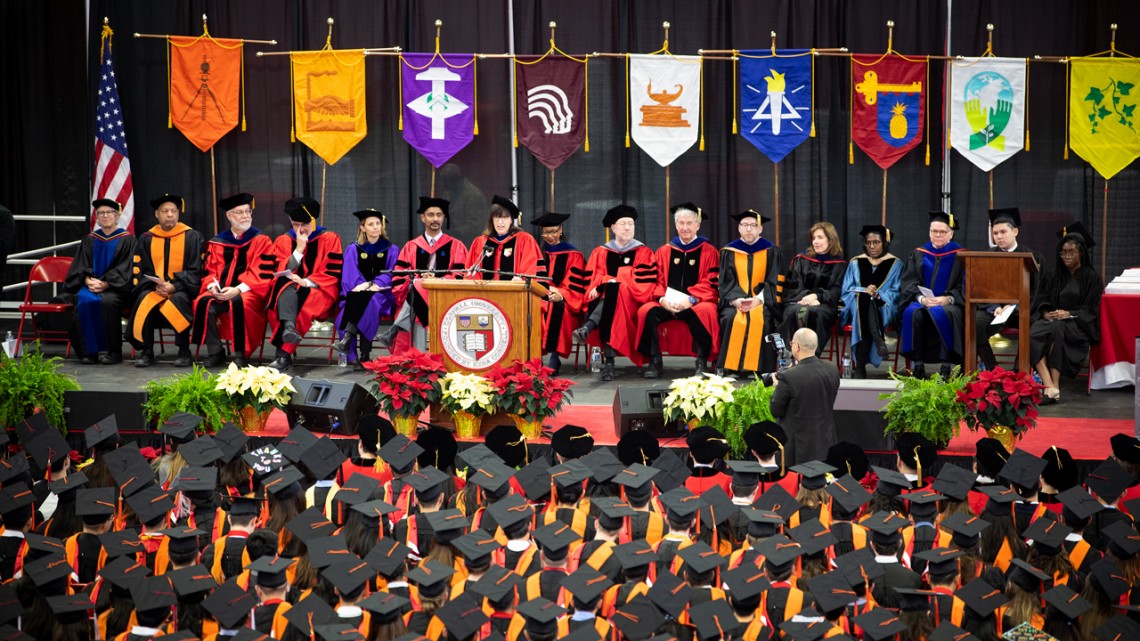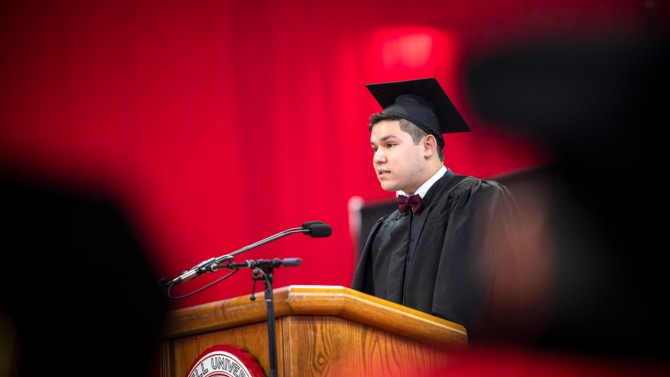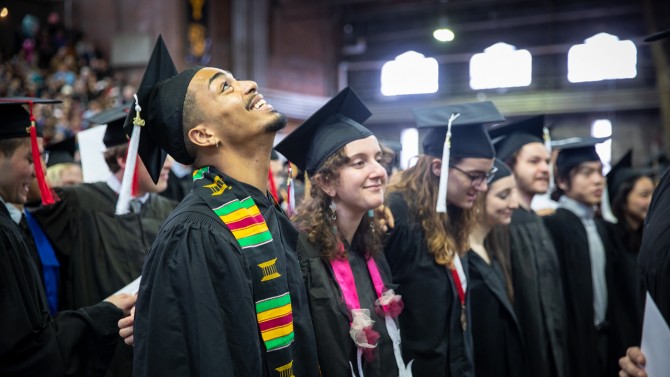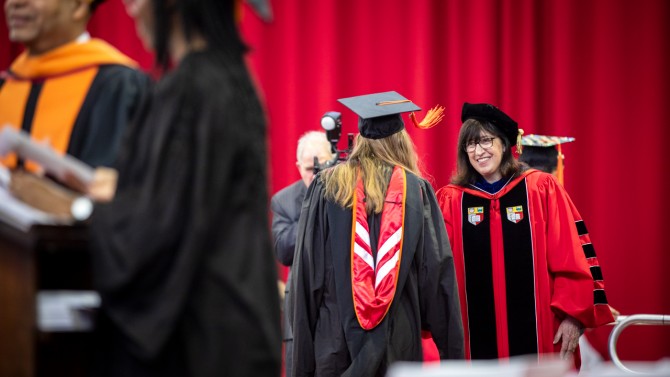
President Martha E. Pollack delivers her address during the Recognition Ceremony for December Graduates, Dec. 21 in Barton Hall. A record 540 graduates were recognized.
December graduates depart with degrees, reading list
By James Dean
A little afraid of heights, Chenab Khakh ’20 waited until late in her Cornell career to climb McGraw Tower’s 161 steps and take in the “mesmerizing” view from the top.
The landscape below was one she first came to know during two years of elementary school in Ithaca, while her mother did postdoctoral work at Cornell. After the family moved to Long Island, she’d treasured memories of the university’s green campus, the subterranean Cornell Store and playing in Stewart Park on the shores of Cayuga Lake.
“It all came together for me, how important Cornell and Ithaca are to me and my family,” Khakh said of the scene. “It’s been such a pivotal place for us.”
On Dec. 21, Khakh added another indelible and slightly dizzying Cornell memory: graduation.
She was one of more than 540 graduates to participate in the university’s largest winter recognition ceremony yet, attended on the winter solstice by more than 2,000 guests in Barton Hall, according to the Office of University Commencement Events.
When their names were called – to cheers and shout-outs from family and friends – the graduates walked in caps and gowns across a stage decorated with red and white poinsettias and green ferns. Each received a certificate (to be replaced later by an official diploma) from the college or school dean, and shook hands with President Martha E. Pollack.
Pollack called the event one of her favorites each year, permitting individual recognition that is not possible during the much larger Commencement ceremonies in May. The same process then, she joked, would take more than nine hours.
In thinking about what pithy advice she could offer such a diverse audience, Pollack said, she concluded that the most memorable commencement speeches delivered the simplest messages.
Hers, in a word: “read.”
“What I’m asking you to do when I ask you to read is to carry out with you the Cornell ethos of seeking truth and valuing knowledge, of embracing diversity and bridging difference,” Pollack said. “Carry it out with you tomorrow, and the next day, and the day after that.”
Pollack urged the graduates to read widely – fiction, history, journalism, poetry and biographies – to see the world from different points of view.
“Read to understand what’s in the world that you can’t see, can’t touch, can’t experience on your own,” she said. “If you do that, the Cornell education you began here will truly never end.”
Jesus Ruiz ’20, the senior class president, who expects to graduate in May, told the December graduates that their journeys are only beginning.
He recalled signature Cornell scenes: the smell of old books in library stacks, daily chimes concerts and watching sunsets from Libe Slope. And he remembered a professor imploring him and fellow students to follow their passions and enjoy their journeys.
“The path to success is not a straight, uphill slope,” Ruiz said. “Instead, the path to success is very much like the paths across this campus – a bumpy road with dips and peaks.”
Perhaps no graduate understood that better than Jonathan Thompson ’10, M.Eng. ’19, who earned a master’s in mechanical engineering. Three years ago, he received a frightening diagnosis, learning that a brain tumor was the cause of headaches and a seizure he had suffered.
After successful surgery and treatment, Thompson, of Pennington, New Jersey, returned to Cornell for a year of graduate school to advance his career, joking that he considered it “the longest business trip ever.”
“I am thankful to God that I have been able to walk across the platform today,” Thompson said.
His ordeal made this graduation “even more special” than when he earned his undergraduate degree from Cornell, said his mother, Michelle Thompson.
“We’re so proud and thankful,” she said.
After the recognition ceremony, Thompson planned to return to a campus lab to put some finishing touches on a project.
The ceremony concluded with graduates – who earned roughly 280 bachelor’s degrees, 250 master’s degrees and nearly 20 doctorates – swaying from side to side as they sang the alma mater.
Khakh, whose generation is the first in her family to grow up in the U.S., will maintain her Ithaca roots next spring through a job with Cornell’s Office of Engagement Initiatives. The Biology and Society major plans to pursue a career in medicine and public health, but will enjoy a little more time with friends finishing their studies – and more breaks at the Cornell Dairy Bar.
But she’ll heed Pollack’s advice for when the time comes for graduates to pack up their apartments, eat a last Cornell ice cream and move on to life’s next step.
“Wherever you go, remember what you learned in Ithaca,” Pollack said. “And remember to bring a book.”
Media Contact
Get Cornell news delivered right to your inbox.
Subscribe



